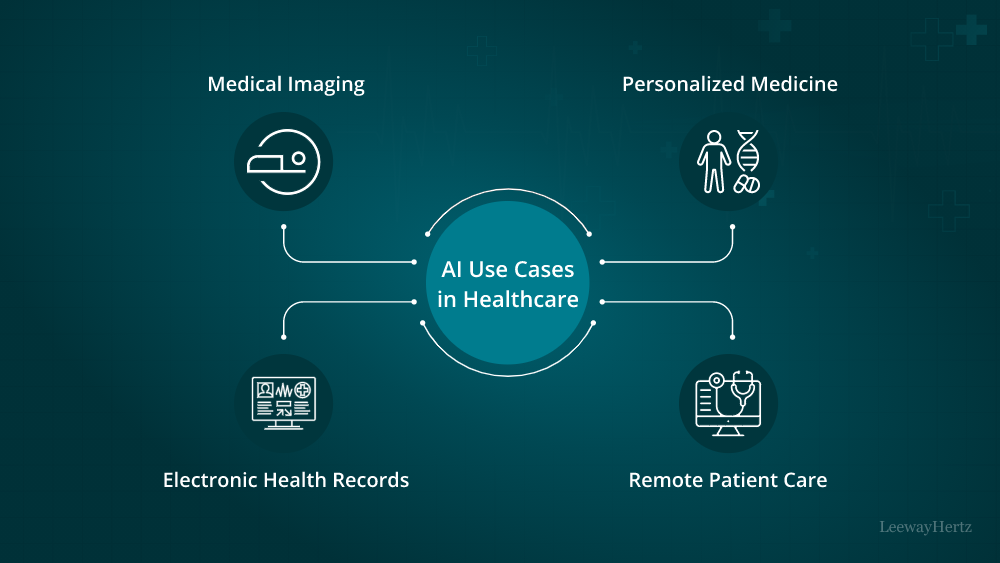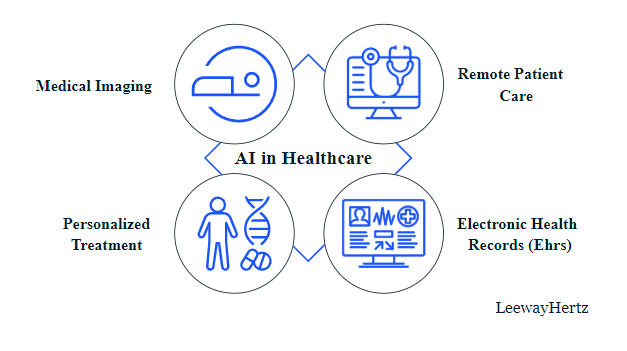AI in Healthcare?—?Innovative use cases & ApplicationsArtificial Intelligence (AI) has emerged as a groundbreaking technology transforming numerous industries, and healthcare is no exception. AI is transforming the healthcare landscape with its ability to process vast amounts of data, recognize...
AI in Healthcare?—?Innovative use cases & Applications

Artificial Intelligence (AI) has emerged as a groundbreaking technology transforming numerous industries, and healthcare is no exception. AI is transforming the healthcare landscape with its ability to process vast amounts of data, recognize patterns, and make intelligent predictions. From diagnosis and treatment to research and patient care, AI has the potential to improve efficiency, accuracy, and outcomes in the healthcare sector.
Artificial intelligence (AI) has significantly impacted the healthcare industry, transforming healthcare delivery and monitoring. AI technology has improved healthcare outcomes by providing accurate diagnoses and personalized treatments. It can quickly analyze vast clinical documentation, identify disease markers and trends, and predict outcomes from electronic health records. The potential applications of AI in healthcare are broad and far-reaching, from early detection to predicting outcomes. With the help of AI, healthcare systems can become smarter, faster, and more efficient, making quality care more accessible to millions worldwide while reducing costs and improving health outcomes.
AI in healthcare plays a crucial role by augmenting the capabilities of medical professionals, enabling faster and more accurate diagnoses, providing personalized treatment plans, and enhancing patient care. By leveraging machine learning algorithms and advanced analytics, AI can analyze complex medical data, identify trends, and generate actionable insights. This empowers healthcare providers to make more informed decisions, optimize workflows, and deliver better patient outcomes.
 Get Certified in ChatGPT + Conversational UX + Dialogflow
Get Certified in ChatGPT + Conversational UX + DialogflowBenefits of AI in Healthcare
AI in healthcare industry is transforming how we deliver and receive medical care. Some key benefits of AI in healthcare include:
Improved Diagnosis and Treatment: AI algorithms can analyze medical data such as images, patient records, and symptoms to assist healthcare professionals in making accurate diagnoses and suggesting appropriate treatment plans, leading to improved patient outcomes.
Enhanced Precision and Personalization: AI enables personalized healthcare by considering individual patient characteristics, genetics, and medical history, allowing for tailored treatment plans and precise medical approaches.
Efficient Workflow Optimization: AI automates routine administrative tasks, streamlines healthcare processes, and optimizes resource allocation, saving time and reducing costs for healthcare providers, ultimately leading to more efficient and effective care delivery.
Improved Patient Safety: AI systems can help identify potential risks, errors, and adverse events in real time, enabling proactive interventions and ensuring patient safety through enhanced monitoring and predictive analytics.
Advancements in Drug Discovery and Development: AI techniques such as machine learning and data analysis can accelerate the discovery of new drugs, identify drug targets, and optimize clinical trials, leading to faster and more efficient drug development processes.
Research and Insights: AI tools can analyze large and complex healthcare datasets, uncover patterns, and generate valuable insights for researchers, contributing to advancements in medical research, disease prevention, and public health strategies
The Impact of AI on Healthcare
The impact of AI on healthcare has been significant and transformative. By analyzing large amounts of medical data, AI has enabled healthcare providers to make more accurate and timely diagnoses. It has also helped develop personalized treatment plans tailored to the unique needs of individual patients. AI-powered predictive analytics has helped identify high-risk patients and prevent disease before it becomes severe. AI in healthcare has transformed drug development, making it faster and more cost-effective. The rise of telemedicine has been made possible by AI, helping patients access care remotely. It improves diagnostic accuracy, optimizes workflows, enables personalized treatments, accelerates drug development, enhances remote monitoring, and empowers patients. AI can revolutionize healthcare, improving patient outcomes, reducing costs, and creating a more efficient and accessible healthcare system.
Use cases and applications of AI in healthcare

AI use cases applications in healthcare include:
Diagnostics and medical imaging: AI algorithms can analyze medical images such as X-rays, MRIs, and CT scans, assisting in the early detection and accurate diagnosis of diseases like cancer, cardiovascular conditions, and neurological disorders. This reduces human error, speeds up the diagnostic process, and improves patient outcomes.
Precision medicine: AI can analyze a patient’s genetic information, medical history, lifestyle factors, and other relevant data to develop personalized treatment plans. By considering individual variations, AI helps healthcare professionals deliver targeted therapies, predict drug responses, and optimize treatment outcomes.
Virtual assistants and chatbots: AI-powered virtual assistants and chatbots can provide 24/7 support, answering common patient questions based on symptoms. They help alleviate the burden on healthcare providers, enhance patient engagement, and provide immediate access to information and support.
Predictive analytics and early warning systems: AI algorithms can analyze patient data, including vital signs, electronic health records, and wearable sensor data, to predict and detect early signs of deterioration. This allows healthcare providers to intervene proactively, potentially preventing adverse events and monitoring patients’ health.
Robot-Assisted Surgery: AI-powered robots can assist surgeons during complex procedures, providing greater precision, stability, and control. These robots can enhance surgical outcomes, minimize invasiveness, and reduce recovery times.
Health Monitoring and Wearable Devices: AI can analyze data from wearable devices, such as smartwatches and fitness trackers, to monitor patient health continuously. This enables early detection of abnormalities, remote patient monitoring, and prompt intervention.
Drug discovery: AI can help accelerate drug discovery by predicting the efficacy of new drug compounds and identifying potential side effects.
Conclusion
AI in healthcare is transforming various aspects of medical practice. By leveraging its analytical power and pattern recognition capabilities, AI enables more accurate diagnoses, personalized treatments, efficient workflows, and improved patient care. As AI advances, it holds tremendous potential to impact healthcare outcomes positively. The applications of AI in healthcare are already evident in various areas, such as improved diagnostic accuracy, personalized treatment plans, streamlined workflows, and remote patient monitoring. AI algorithms are assisting healthcare professionals in making more accurate diagnoses, optimizing treatment decisions, and predicting patient outcomes. This improves patient safety and outcomes and enhances healthcare delivery efficiency, allowing providers to allocate resources more effectively and focus on delivering high-quality care.
Furthermore, AI in healthcare is a rapidly evolving field. As technology advances, we expect even more sophisticated AI applications in drug discovery, robotic surgery, genomics, and patient engagement. However, as AI continues to evolve, important considerations must be addressed. Ensuring patient privacy and data security, addressing algorithm biases, maintaining ethical standards, and establishing regulatory frameworks are crucial aspects that need careful attention. Collaboration between healthcare professionals, researchers, policymakers, and technology experts is essential to maximize the benefits of AI while addressing potential challenges.
 Get Certified in ChatGPT + Conversational UX + Dialogflow
Get Certified in ChatGPT + Conversational UX + DialogflowAI in Healthcare?—?Innovative use cases & Applications was originally published in Becoming Human: Artificial Intelligence Magazine on Medium, where people are continuing the conversation by highlighting and responding to this story.





